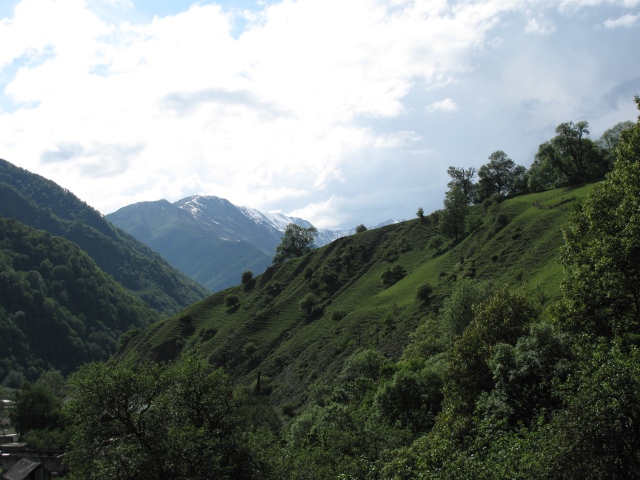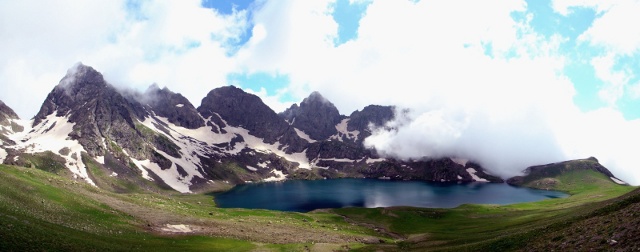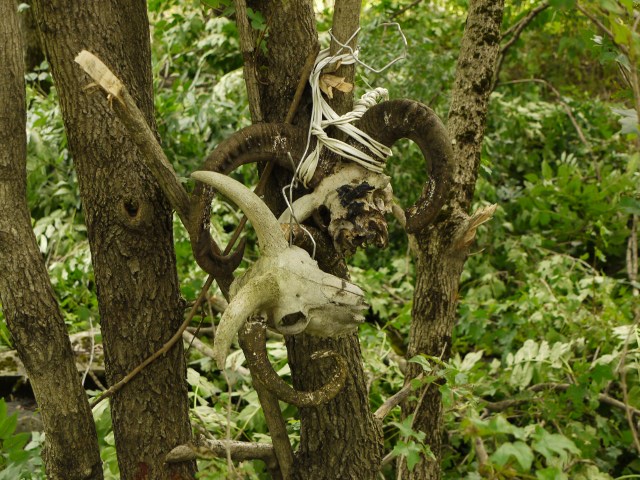The Cult of Iakhsar
IAKHSAR (from the Ossetian or perhaps Alanic word æhsar, "strong"—with thanks to Prof. Kevin Tuite; see Dumézil (1965), Le livre des héros: Légendes sur les Nartes, "Naissance d'Æhsar et d'Æhsartæg", Note 4) is a deity of the Pshav-Khevsur pantheon. His main shrine is situated on a precipitous, grassy mountain spur overlooking the village of Shuapkho in Pshavi. Fenced off, the shrine consists of an altar surrounded by several quasi-ruined stone buildings—notably a bell-tower (Georgian საზარე, sazare) and a long, low building (Georgian დარბაზი, darbazi) in which ritual beer used to be brewed and stored and where cult objects (the shrine's sacred flag, candlesticks, a knife for sacrificing offerings, bowls, &c.) are kept. Other buildings (probably including a granary—G. ბეღელი, begheli) are just visible among the trees behind the altar and bear witness to the days when the cult was much stronger and more complex, but the area is deemed so holy and ritually pure that it is off limits to all. Even the khevisberi, the pagan priest who officiates during festival days, may go no further than the bell-tower to ring the bell during certain rituals.
Whilst the cult of Iakhsar is centred upon the village of Shuapkho and whilst he is also the clanic deity of the wider Kistauri community (Georgian თემი, temi), his cult is not exclusive to Pshavi: several other shrines to him stand in both Khevsureti and Tusheti (e.g. in Dartlo). For more on the cult of Iakhsar as celebrated every year in Shuapkho, see this series of photographs.
|
|
The following "Life of Iakhsar" was copied from Shorena Kurtsikidze and Vakhtang Chikovani's remarkable Ethnography and Folklore of the Georgia-Chechnya Border—Images, Customs, Myths & Folk Tales of the Peripheries (Munich: LINCOM EUROPA 2008 (pp. 273-283). N.B. I have copied the legend as faithfully as possible, despite the appalling quality of the translation (which I have sometimes tried to improve) and the numerous (mostly geographical) inconsistencies. The three photographs were added as illustrations. |
|---|
3. KISTAURI FAMILY SHRINES: IAKHSAR, KOPALA AND PIRKUSHI
In the beginning, Iakhsar was mortal—a saintly monk and worshipper of God whom the Creator had granted strong powers. God had granted him these mighty powers so that he could fight and defeat devs because in those times the dev-idols were already out on the Earth, slaughtering and eating humans. Because people feared the devs, they could not go anywhere. For this reason the God-order-giver blessed both the saintly monks Kopala and Iakhsar and granted them the strength and power to fight the devs and exterminate them.
Iakhsar had a small shrine and a monk's chamber in a place called Ninakhi, one and a half kilometres west of the village of Shuapkho. The ruins of this shrine are still visible on the mountaintop. Like the present church, the shrine had its entrance and doors from the west side directed to the east. In those times, as well as today, this place was covered with dense oak woods. Here, in front of his monk's chamber, Iakhsar also had a retreat-guardhouse. There stood four oaks grown from the same root. The oaks are still there, and the people call this place Korbudian Mukhati.

Iakhsar's shrine is among the trees on the right, on top of the spur. The village of Shuapkho is just visible in the bottom left-hand corner.
Guarded by the oak trees, Iakhsar watched the huge dev [= a kind of ogre—A.B.] Gamkhveura. (He was called Gamkhveura because his family—a nine-headed wife and nine sons, all of them brave men—kept multiplying and growing; they were very wealthy. No one knows how many heads Gamkhveura himself had.) This dev dwelled a couple of kilometres west of Iakhsar's shrine, in a place which was later named Gamkhveurtkari after him. Across the Aragvi River from Gamkhveurtkari was another village full of devs. (People from the village of Shuapkho now live there, and the place is called Tkhiliana.) In the village of Shuapkho lived the families of the Kistauri clan. Gamkhveura and the other devs who lived across the river had a fishing net tied to both shores of the Aragvi River, with which they were catching and eating people who walked there.
There was a nine-headed dev mother; she brought up nine sons,
She carried on her head a frightful bowl for beer, made of brass.
After the devs had multiplied and settled in these places, they wished to occupy Avisgori. (Avisgori is a place between Ninakhi and Shuapkho, where back in those times was Iakhsar's dwelling place [sic—A.B.].) The devs went there and started building their homes. Iakhsar found out about this and stole up on the devs from the gorge called Khatis Kheoba. So Iakhsar appeared at the devs' construction site. The elder brother dev told the others, "Take a look at this nice meal approaching us!" But the younger brother replied, "It may not be a meal at all but Iakhsar himself! Look how bravely he walks towards us!" The devs became frightened and confused. Iakhsar arrived just as the nine devs were trying in vain to place a huge pediment stone above the doorway. The devs laughed at Iakhsar and teased him, "Come here brother, help us to lift the stone and to put it above the doorway!" (The stone was enormously big and heavy.) Iakhsar rolled up his sleeves, grabbed the huge stone, threw it up, and placed it above the doors. The fear-stricken devs ran away. Then Iakhsar grabbed the same stone again, threw it towards the running devs, and crushed the dev Gamkhveura's house.
But God had not yet commanded the complete extermination of the devs in this place. Kopala was ordered to fight and defeat the devs in Tsikhetgori and, according to the promise the two Sons of God had made to each other, Iakhsar was to exterminate the devs living in the village of Khashari at the head of the Iori River. [Tsikhetgori ("castle-hill") is probably the hill of the same name east of Shuapkho, two kilometres up the valley of the Pshavis Aragvi River, and Khashari is south of the Pshavis Aragvi Valley—A.B.] In Khashari lived the famous devs Muza and Beghela. Muza was the king of the devs, and Beghela was a beautiful woman whose hair was so long that when she sat on her tall chair her hair would spread over the ground in seven layers...
Above the village of Udzilaurta there is an open space called Iremtkalo, from which Kopala and Iakhsar were challenged by the devs to compete with them by throwing enormous rocks towards Tsikhetgori and find out who was the strongest. Famous devs were summoned from all four corners to take part in the competition. Although Iakhsar and Kopala were to compete, the God-order-giver had ordered them to kill all the devs, so Iakhsar secretly made his way to a place called Saparavi Qeli on the Khashari mountain ridge to hide and lie in wait for the dev Muza who was making his way from Khashari to Iremtkalo. After killing Muza, he would climb down to Khashari and exterminate all the devs who lived there. Indeed, having climbed up from Khashari, Muza appeared on the mountain. Gazing towards Iremtkalo, he roared at Kopala and the other devs gathered there for the competition. At that very moment, Iakhsar revealed himself and hit the dev's head with his scourge and killed him on the spot. As he was dying, the mortally-wounded Muza roared so loud that even the other devs in Khashari heard him and sensed that Muza was in some kind of trouble. But before they could come to his aid, Iakhsar advanced with his scourge and rushed towards them and slaughtered every single dev in Khashari. He even crushed their homes, reducing them to ruins. Some devs managed to escape towards the Iori river, but Iakhsar followed them and killed them there. (Some say that the ruins of the devs' houses in Khashari are still visible, and that they were built of such enormous stones that even two men working together cannot move them.)
Here is the story of what was happening in the meantime in Iremtkalo: The devs and Kopala reinforced a threshing-floor-sized area with slates (this is the place where Kopala's bell-tower [still—A.B.] stands), for if they had started throwing the rocks without first strengthening the ground with slates, the ground would not have been able to support their weight and would have slid down the mountain. At first everyone waited for Iakhsar and Muza to arrive, but Kviria [a divinity second in importance only to God—A.B.] ordered them to start throwing the rocks. Kopala knew why Iakhsar and Muza had not showed up, but the idea never occurred to the devs for they thought none would even dare fight the powerful Muza. The devs' head wrestler [sic—A.B.] threw a rock, and it landed next to Tsikhetgori. Kopala was next. He used all his power to throw his rock further but Kviria nonetheless helped him by touching the rock with the tip of his whip, sending it further than the dev's. The devs then tried to throw the rock back to Iremtkalo, but could not even move it. (Some say that the even now the rock bears witness to their struggle; the rock shows signs of having been dragged back a little.) The frightened devs tried to flee, but Kopala used his power and his scourge and defeated them all. He also reduced their houses to ruins, carried off all their possessions, and settled there. His bell-tower still stands in Tsikhetgori. Pshav and Khevsur often visited [and still visit—A.B.] this place to pray during the Tsikhegoroba festival.
Here are the stories of how Kopala and Iakhsar exterminated the devs: According to what people relate, there are many sites where the ruins of the devs' old houses are still visible. The Sons of God swept the devs off the surface of the world. In those places people still pray to Iakhsar or Kopala. For example, there is Kopala's rock in the Pshavis Aragvi River. When Kopala was still mortal, a dev stole the refectory stone from Tsikhetgori and carried it down the mountain. Kopala caught up with him, and killed the dev with his scourge. The villagers of Khomi took the stone and placed it above the road. The rock is still there. People still pray for brave Kopala. (Some say the rock still bears marks from the dev's rope and Kopala's scourge.)
A dev was returning from the hunt, carrying a deer in one hand and a beech tree he had uprooted in the other. Kopala met him on the road, and killed the dev with his scourge. The dev's body turned into a rock, which is still there today: It is the long rock visible in the Aragvi River, and according to what people believe the rock is the famous dev Avtandil turned into stone. The place is now called Avtandilis Nakani—the place where Avtandil rushed down and died.
Here is another story about the stones of Kopala: The devs were gathering rocks to dam the river in the village of Karthana in order to flood Pshavi and Khevsureti. (Karthana is located in a narrow gorge through which flows the Pshavis Aragvi River. The cliffs of the gorge are very steep, and the gap between them is so narrow that the river barely squeezes through.) Kopala found out about this and went after a dev who was carrying a huge rock to dam the water, killing him with his scourge. The rock later became a shrine; people call it Kopala's Rock.
While Kopala was destroying the devs in all these places, Iakhsar followed the Iori river and defeated all the devs who lived in the surroundings. These places are full of towers and shrines built in his name. For example, there was a large family of devs who lived in the village of Ikhincha (in lower Tianeti). Iakhsar fought and defeated them, and took possession of all their property. People later built a shrine to Iakhsar in this place and prayed to him.
A very famous dev lived in upper Tianeti. His name was Verkhvela. Verkhvela and his family lived at the top of upper Tianeti, in a narrow canyon. No one could cross this canyon, for Verkhvela had a large family and they had been catching and eating humans. One day, they caught a goldsmith named Pirkushi and made him their prisoner, forcing him to forge tools and weapons of gold and silver. Try as hard as he might, Pirkushi could not escape. When Iakhsar found out about this, he secretly came to Pirkushi and told him: "I will help you if you make a good silver bell for me." Pirkushi promised he would cast the bell and make other things, and Iakhsar attacked the devs. He first slaughtered the dev Verkhvela with his scourge and then killed the other devs, and so he saved Pirkushi. Pirkushi went to settle in the village of Akhadi [in Pshavi—A.B.]. He kept his promise to Iakhsar, and later also became a Son of God. Pirkushi had three beautiful silver bowls which Iakhsar wanted to acquire, but Pirkushi refused to give him the bowls, so Iakhsar took them by force and brought them to his sanctuary. Even after both Pirkushi and Iakhsar had become Sons of God, they still quarrelled over these bowls. Finally, they brought their case to God's chamber. The God-creator and Kviria considered the matter, and ruled that Iakhsar must return the bowls to Pirkushi, for he had taken them by force and the God-order-giver did not allow the Sons of God to fight with each other. In the end, Iakhsar said through the words of a kadag [a soothsayer—A.B.]: "Pirkushi and I had a trial at the God's chamber and the bowls were returned to Pirkushi." After the trial, the bowls were removed from Iakhsar's sanctuary and taken to Akhadi-Pirkushi. Since that day, it has been forbidden for people from Shuapkho to marry people from Akhadi and vice-versa. This rule is still strictly followed.
Iakhsar exterminated all the devs living by the Iori River and in Tianeti. He then returned to Shuapkho and defeated the devs there. From his retreat-guard-house Iakhsar shot his scourge towards the devs living in Gamkhveurtkari and killed all of them and destroyed their houses. But Iakhsar then suddenly found out that one greater dev had escaped to Khevsureti. Iakhsar went after him. He followed the Aragvi River up against the current and passed Kmosti and Roshka. Near Abudelauri (Kmosti Mountain) he caught up with the dev. The dev saw that there was no escape, and so he sank himself into Lake Abudelauri. Iakhsar followed the dev into the water and shot him with his scourge and killed him on the bottom of the lake. But the dev's blood then covered the surface of the lake, and Iakhsar could not find his way out of the water. His way out was now closed.

One of the three Abudelauri Lakes
Iakhsar was missing for three years, unable to escape the waters of the lake. People started looking for Iakhsar and wondered "What could possibly have happened to that saint-monk—the dev-defeater Iakhsar who saved our lives but has now disappeared himself?" At last, a fortune-teller [sic—probably a kadag i.e. a soothsayer—A.B.] found out Iakhsar's fate and told the people. But no matter how hard they tried, they could not save Iakhsar's life. The fortune-teller then announced to the people that "Iakhsar drowned in the slime of Lake Abudelauri. He killed the dev there, and the dev's blood covered the lake. Iakhsar will not be able to escape until his way out is cleaned [sic—the ritual impurity of the dev's blood soiled the surface of the lake, thus preventing the ritually pure, holy Iakhsar from passing through—A.B.] and opened." People wondered how they could possibly clean the way to save Iakhsar. Again the fortune-teller advised them: "In the village of Blo there is a man who has a four-horned and four-eared sheep. Take this sheep and sacrifice it to Lake Abudelauri and Iakhsar's way will then open." The people went to this man in the village of Blo and asked him for the sheep. The man did not refuse. They then took the sheep and sacrificed it on a rock on the shores of Lake Abudelauri—on the very same rock that had been split in four by Iakhsar's scourge when he killed the dev. The sheep's blood flowed into the water. Suddenly, the surface of the lake opened and a diamond stone appeared from the waters. Soon Iakhsar also appeared and sat on the stone in the shape of a dove. The serfs [in the sense of "followers", bound to Iakhsar and his cult—A.B.] saw him appear and crossed themselves.

The skulls of two four-horned sheep sacrificed to Iakhsar at his shrine above Shuapkho, photographed in 2010.
(The upper skull seems to have lost a horn over the years.)
After this Iakhsar was no longer mortal and became a Son of God. He flew up from Lake Abudelauri and settled on the highest peak of the Karat'e Mountain above the village of Likoki. People later built a shrine (bell-tower) on this spot in his name. Iakhsar then flew further and settled on a high mountain called Ubistavi. There too people built a shrine and a bell-tower in his name. From there, Iakhsar then flew down to the village of Shuapkho and established himself there permanently.
Iakhsar's actions and stories have been revealed to the people through the words and stories of fortune-tellers. Iakhsar relates: "The devs had a village on the bottom of a lake. When I went down into the water, the devs captured me and kept me there. Only after a sheep was sacrificed in my name did the way open up for me; also, such was the wish of God, and so I escaped." Iakhsar told the owner of the four-horned, four-eared sheep: "Because you have saved my life and have not refused my serfs your sheep to be sacrificed, in return I will help you three times. Call my name when you are in trouble and I will save you." (To call a name meant that when in trouble a man would take off his hat and ask a deity for help. The deity would immediately hear the call and help the man, but if a man had committed some sin then the deity would not help him but instead would send [further!—A.B.] suffering and misfortune upon him.)
Once, the family of this man from Blo became very ill with dysentery. The family was on the verge of death. The man crossed himself and called Iakhsar's name: "Blessèd Iakhsar, do not be angry with me for calling your name, only cure us from this illness, save our lives, and if we live, the next saint's day together with my family I will come to your door ["go to your shrine"—A.B.] with gifts and candles." Iakhsar heard the man's words and cured him and his family.
The next time, boil disease [sic—probably bubonic plague, which still ravaged the Georgian mountains as late as the XIXth century—A.B.] had spread out in the villages. The man and his family in the village of Blo also fell ill. The man called Iakhsar for help again, and Iakhsar saved their lives again. Following both these interventions, the man brought Iakhsar a sacrificial animal and candles, and so worshipped him according to custom and tradition. But, the third time, the man called upon Iakhsar for an ordinary matter: The man and his family had to gather freshly-mown hay, but a cloud of heavy rain appeared in the sky. The man was worried, since he was afraid the heavy rain might ruin his hay. He then remembered Iakhsar and called his name: "Blessèd Iakhsar, do not let the rain damage my hay and I will come to your door to pay you tribute!" At that moment, Iakhsar was dealing with some important matter at the God's chamber. When he heard the man call him, he immediately left the God's chamber and went to help him, but when he saw that the man was not suffering from real hardship, and that he had called him for a trifling matter, to save his hay, Iakhsar became angry. He cursed the man and his family and completely destroyed them. He then declared through the words of a kadag: "I was present at the God's chamber to discuss some important matters when I heard a call for help. I could not break my promise of help, so I left the God's chamber and headed to the place where the call was coming from. Here I saw a man calling for my help whereas he was not undergoing any serious hardship. The greater matters at the God's chamber were left unsolved, and this is why I was angered and destroyed the man and his family."
Iakhsar and Kopala exterminated all the devs. By the God's will and power, the two monks became Sons of God. Kopala settled on the peak of the mountain of Udzilaurta and also in Tsikhetgori. Iakhsar settled in Shuapkho.
After Iakhsar descended from Karat'e Mountain, he settled in Avisgori and the centre of Gamkhveurtkari. Large tracts of land surround this place to the east and to the west. Here, in the middle of these lands, Iakhsar established his domains. Since Iakhsar had lived in the village of the Kistauri clan when he was still mortal, he chose this place as his domain after he became a Son of God. He then announced that the families of the Kistauri clan were his serfs ["followers"—see above—A.B.]. The Kistauris first lived in the village of Shuapkho. They shared a single family name. But later they changed their residence; some moved to Strophavi, and some moved to Khorkhi, Vankhevi and Arajikha...
Unless stated otherwise or obviously not the case, all the text and images on this website are © A.J.T. Bainbridge 2006-2010
Gmail: alexjtb

